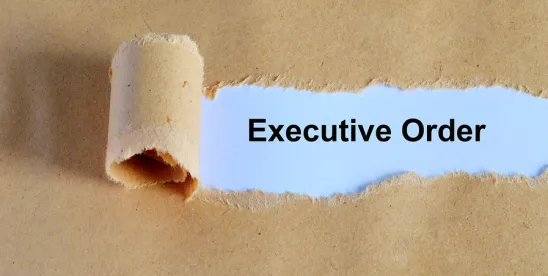Go-To Guide
- An Aug. 7 executive order requires agencies to ensure that all federal grants permit immediate termination for convenience if the award no longer aligns with agency priorities. This must be incorporated into existing awards to the extent permitted by law.
- Each agency must designate a senior political appointee to develop and oversee a review process for new funding opportunities and existing awards to ensure alignment with agency priorities.
- The executive order directs that, in making federal awards, preference should be given to institutions with lower indirect cost rates over large research universities and institutions with higher indirect cost rates and instructs OMB to amend the Uniform Guidance to limit the availability of discretionary funding for facilities and administrative costs.
- Recipients will be required to obtain agency permission to draw down general grant funds and must support each request with written explanations.
- Consistent with the 2024 Uniform Guidance revisions, funding opportunities should be simplified, streamlined, and written in plain language.
On Aug. 7, 2025, President Donald Trump signed a new executive order, “Improving Oversight of Federal Grantmaking” (EO), which seeks to significantly increase oversight and scrutiny of discretionary grants, ensure that grant agreements permit agencies to terminate them if they “no longer effectuate[] program goals or agency priorities,” 2 CFR 200.340(a)(4), limit the availability of funding for indirect costs, and streamline the grant application process. The EO states it is intended to address the administration’s concerns about ineffective or inefficient uses of funds and past funding awarded for purposes that do not align with the current administration’s priorities.
Grant Termination Clauses
By Sept. 6, 2025, each agency must submit a report on (1) “whether the agency’s standard terms and conditions for discretionary awards permit termination for convenience and include the termination provisions described in 2 CFR 200.340(a)”; and (2) the percentage of discretionary grants containing such provisions.
The EO focuses on 2 CFR 200.340(a)(4), which permits agencies to terminate a grant “pursuant to the terms and conditions of the Federal award, including, to the extent authorized by law, if an award no longer effectuates the program goals or agency priorities.” In the 2024 revisions to the Uniform Guidance, the Office of Management and Budget (OMB) specified this provision can only be used when expressly included in the terms and conditions of an award, stating in the preamble to the final rule that this was merely a clarification of the existing requirement. Since the current administration took office, agencies have cited 2 CFR 200.340(a)(4) as the basis for numerous recent grant terminations. In litigation, the administration argued it can rely on this clause even if it is not expressly included in the terms of the grant agreement, but some courts have rejected that position.
To enhance agencies’ ability to terminate awards inconsistent with the administration’s priorities, the EO provides that agencies must amend existing grants to include “termination for convenience” provisions “to the maximum extent permitted by law,” and ensure such provisions are included in all future discretionary grants and amendments to grant awards. The EO also directs OMB to revise the Uniform Guidance to “further clarify and require all discretionary grants to permit termination for convenience, including when the award no longer advances agency priorities or the national interest” (subject to certain exceptions) and instructs agencies to revise applicable regulations to require that future awards permit termination for convenience.
Enhanced Oversight and Accountability
The EO directs each agency head to designate a senior appointee to develop and oversee a review process for new funding opportunity announcements/notices of funding opportunity (NOFOs) and discretionary grants. The review process must ensure alignment with “agency priorities and the national interest.” Until the process is in place, agencies may not issue new NOFOs without approval from the designated appointee, unless otherwise required by law. One or more senior appointees must also review discretionary grant awards annually “for consistency with agency priorities and substantial progress.” The review must include “an accountability mechanism for officials responsible for selection and granting of awards.”
Senior appointees and their designees must use independent judgment in evaluating NOFOs and discretionary grant awards and may “not ministerially ratify or routinely defer to the recommendations of others.” In reviewing discretionary awards and NOFOs, senior appointees must ensure the grants (1) “demonstrably advance the President’s policy priorities,” if applicable; and (2) do not “fund, promote, encourage, subsidize, or facilitate” diversity, equity, and inclusion, gender ideology, illegal immigration, or “anti-American values.”
Provisions Impacting Universities and Research Institutions
Consistent with other administration efforts to limit indirect cost rates and concerns about grants to certain universities, the EO includes several provisions impacting universities and research institutions, including that:
- “[A]ll else being equal,” preference should be given to “institutions with lower indirect cost rates.”
- OMB must amend the Uniform Guidance at 2 C.F.R. Part 200 to limit the use of discretionary grant funds for costs related to facilities and administration.
- Funding must be awarded to diverse recipients, not “a select group of repeat players,” and “agencies should prioritize an institution’s commitment to rigorous, reproducible scholarship over its historical reputation or perceived prestige.”
- Priority should be given to institutions that implement “Gold Standard Science,” consistent with EO 14303, Restoring Gold Standard Science,” issued on May 23, 2025.
Streamlining Application Requirements
The EO reiterates the 2024 Uniform Guidance revisions’ goal of ensuring that NOFOs are simplified, streamlined, and written in plain language. It also requires that the OMB director make further revisions to the Uniform Guidance to “streamline application requirements.”
Enhanced Scrutiny on Drawdowns
The EO provides that “[t]o the extent practicable and consistent with applicable law,” in future discretionary grants, agencies must (i) prohibit recipients from directly drawing down general grant funds for specific projects without the affirmative authorization of the agency; and (ii) require grantees to provide written explanations or support, with specificity, for requests for each drawdown.” Currently, the Uniform Guidance requires advance payments to recipients provided they maintain “written procedures that minimize the time elapsing between the transfer of funds and disbursement … and financial management systems that meet the standards for fund control and accountability as established in this part.” The EO does not specify what additional documentation may be required for drawdowns in the future.
Key Takeaways
Reviews and approvals by political appointees, delayed funding opportunities, heightened scrutiny over drawdowns, and implementation of termination for convenience clauses will have significant impacts on grant recipients’ ability to access current and future funding. Expressly including the clause at 2 CFR 200.340(a)(4) and other termination for convenience clauses in grant agreements may bolster the government’s ability to terminate grants that do not align with the administration’s policies. In addition, the new requirement to justify drawdowns means grantees should consider reviewing and improving their documentation practices to ensure they can adequately support each request for funds.
While litigation may slow down implementation of certain aspects of the EO, recipients should be prepared for potentially more limited access to funding going forward.




 />i
/>i

